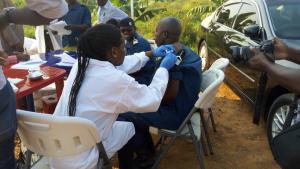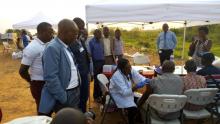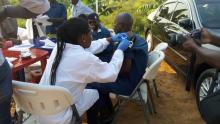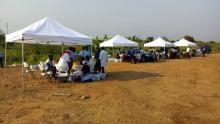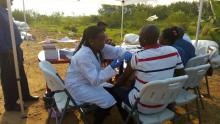Burundi launches ebola vaccination campaign for health and front-line workers
Bujumbura, 14 August 2019 – On 13th August, the Ministry of Public Health and AIDS Control kicked off the vaccination campaign for front-line staff against the Ebola virus disease. The campaign started at the Gatumba entry point at the Border with the Democratic Republic of Congo.
The Ebola vaccination campaign is part of Burundi's preparation for a possible case of Ebola. The campaign will be implemented under leadership of the Ministry of Public Health and AIDS Control, with the support of the World Health Organization (WHO). Financial support is provided by GAVI, the Vaccine Alliance.
Burundi has received doses of the Ebola vaccine (rVSV-ZEBOV) to provide protection against the Zairian strain of the virus, which is currently affecting the Democratic Republic of the Congo (DRC). Although this vaccine is not yet approved and its commercial use is not yet authorized, it has been shown to be effective and safe during Ebola outbreaks in West Africa. Further scientific research is required before the vaccine can be licensed.
The vaccine is used for humanitarian purposes to protect people most at risk of an Ebola outbreak. It will be administered to health and front-line staff working in priority areas where there is a risk of transmission. These are health workers working at points of entry into the country as well as other people potentially exposed to the Ebola virus disease, such as laboratory workers, surveillance teams and people responsible for carrying out dignified and secure burials.
"The vaccination of health and front-line staff is a significant step forward in preparing for the response to this disease," said Dr Kazadi Mulombo, WHO Representative in Burundi. "The vaccine proved highly protective against Ebola in a trial conducted in Guinea in 2015. Pending consideration by the relevant regulatory authorities, the WHO Strategic Advisory Group of Experts on Immunization recommended that the rVSV-ZEBOV vaccine be used as part of a protocol on expanded access and compassionate use during Ebola outbreaks related to the Zaire strain, such as the current one in the DRC. In Burundi, we will use it for prevention purposes.”
Vaccination is one of the many preparedness measures that Burundi has planned to put in place. WHO deployed experts to support these activities and trained 50 national immunization workers on behalf of the Ministry of Public Health and AIDS Control. The training consisted of familiarization with the principles of good clinical practice and standard protocol procedures. This new knowledge is necessary for the administration of the Ebola vaccine and includes the ability to conduct ring vaccination, vaccinating only those people who are most likely to be infected in case of a reported Ebola case in Burundi.
No cases of Ebola have been reported in Burundi, but preparation remains crucial. WHO, which supports Burundi in preparedness activities, has provided logistical support to ensure the cold chain and facilitated the provision of supplies and equipment necessary to carry out the vaccination campaign.
WHO provided special vaccine carriers and upgraded the cold chain of the Expanded Programme on Immunization of the Ministry of Public Health and AIDS Control, through the installation of additional freezers adapted to this type of vaccine. The capacity of local laboratories to analyse samples taken from people suspected of being infected with the Ebola virus has also been strengthened through the upgrading of the laboratory of the National Institute of Public Health.
WHO also supports the Government of Burundi in engaging with communities, community-based active surveillance, capacity building for infection prevention and control and case management and the dissemination of information on Ebola through the mass media.
ABOUT WHO:
The World Health Organization is the specialized agency of the United Nations Public Health Organization. Its goal is to bring all people to the highest possible level of health. WHO's role is to lead and coordinate international health within the United Nations system. It leads on key health issues and encourages partnerships where joint action is needed. Through offices in more than 150 countries, the World Health Organization supports countries in achieving their health objectives and supports their national health policies and strategies.
For more information on WHO and its activities, visit www.who.int
For the media:
Journalists who want to interview the WHO Representative and experts from the WHO Burundi Country Office are requested to contact the following focal points.
Point focal communication
Bureau de la Représentation au Burundi
Boulevard de l’Uprona, Rohero I
BP 1450 Bujumbura
Tél. +257 79 58 76 47
nkezimanad [at] who.int (nkezimanad[at]who[dot]int)
Communications Consultant, WHO Burundi
Email: bijunior2000 [at] yahoo.fr (biraronderwaj[at]who[dot]int)
Tel. +257 79 47 98 98
Communications and marketing officer
Tel: + 242 06 520 65 65 (WhatsApp)
Email: boakyeagyemangc [at] who.int (boakyeagyemangc[at]who[dot]int)



